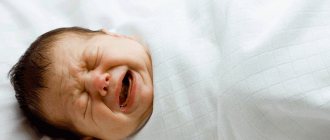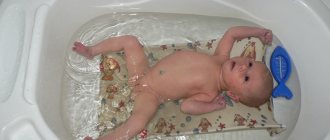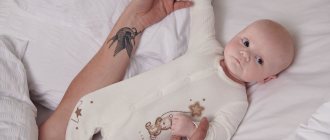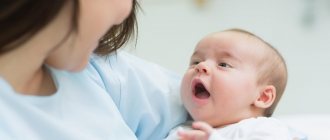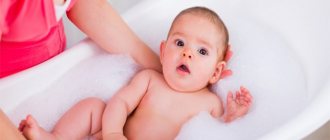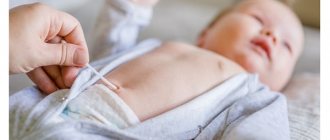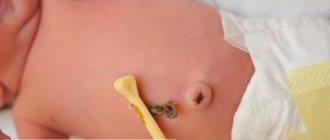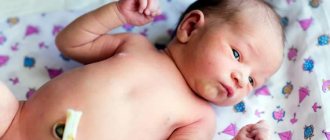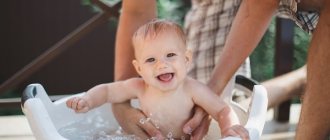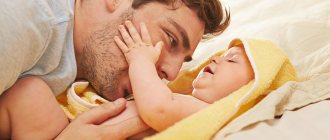Probably every mother faces the question of how to bathe a newborn baby for the first time at home. At what time, how to wash correctly, whether to use herbal decoctions and many other questions. Looking through the family photo archive, I found photographs from the baby’s first bath after being discharged from the hospital and immediately remembered this moment in great detail. I was lucky that my mother and mother-in-law were nearby for the first time.
To be honest, I watched more and was on the lookout. For the first time, the water was boiled. We filled the bath with water and diluted the potassium permanganate to a slightly pinkish state. We checked it with a thermometer. Then they carefully lowered the baby, wrapped in a diaper, so that he would not be afraid of the water. He wasn't afraid.
On the contrary, he really enjoyed swinging on the waves, and when they pulled him out and wrapped him in a towel, he shouted to everyone about his displeasure at being torn away from such a pleasant but short-term procedure. A whole ritual, not an evening swim.
General information about what you need for swimming
The most important thing that should be in the house for bathing a baby is a special baby bath. It is worth purchasing even if you want to bathe your baby in a large bathtub. The first acquaintance with the aquatic environment is best done in a small amount of water.
It is also worth purchasing a small bath because sometimes a child should be bathed in a decoction of herbs, which will be needed several times more for a large bath than for a small one.
Another positive aspect in favor of a baby bath is that it will certainly be clean when you need it, and you won't have to worry about various “adult” germs and bacteria.
Also, along with the bathtub, they now sell a special soft pillow so as not to place the child on the bare bottom. You can use a regular diaper instead.
The first bath of a newborn should take no more than 5-10 minutes. The procedure itself is very important for the baby. Bathing allows you to avoid prickly heat and diaper rash, which are quite common in babies. You can bathe your baby on the second day after you brought him home from the hospital.
It is very important that the first swim takes place in a calm and favorable atmosphere. The bathing process should bring joy not only to the baby, but also to the parents.
How to properly bathe a baby for the first time
Now let's move on to bathing the child. It is advisable to do this together with your husband, not only for help, but also for the baby, he will be pleased to feel both mom and dad, as well as hear you both, then the baby will not be afraid and will always enjoy bathing .
Yes, and of course you need to talk to your baby more often during bathing, voice all actions, this is very useful, and for mom too. The duration of bathing a newborn baby is approximately 2-3 minutes. As you grow older, time increases.
This is the correct way to hold a baby on your tummy This is the correct way to hold a baby on your tummy
This is the correct way to hold your baby on his back
- First of all, we undress the child completely, allowing him to lie down for a minute. This is how we also do air baths and harden the baby.
- Now we hold the child in a lying position, making sure to hold the head, first dip the legs a little in the water . Do not put into water immediately. Move your feet in the water a little.
- Now we can immerse the child in water , but so that the head is not in the water, I think you understand why. It's okay if water gets into the ears , children are not afraid of it. Avoid getting water into your eyes, nose and mouth.
- After lying down a little, just a little, you begin to wash your face first : with your free hand you moisten your forehead, then your whole face. Water should not get into the nose, mouth and eyes. Do not rub or press too hard.
- Now wash your neck , raising your chin a little. It needs to be washed very well.
- Now we wash our arms, legs, body and groin well .
- Then we carefully turn the baby onto his tummy , also onto your hand. And in the same way, we wash the neck, body, legs and arms. Rinse well behind the ears.
- Turn over onto your back again. Now we wash the head . You can use soap or foam (there is no difference). Be careful not to get soap into your eyes. Lather your hair a little and rinse it off carefully, from the forehead to the back of the head.
- Now we turn the baby over on his tummy and hold him above the water, take the prepared ladle of water, and wash the baby from the neck to the feet for the first time . The second time you can do it from the head and into the legs.
- We rinse and cover the head with a towel or diaper and place it on the back.
- Now, instead of using three towels, we simply dry the child with blotting movements. The baby's skin is very delicate and cannot be rubbed.
OK it's all over Now. Now only small procedures remain. For example, treating the navel with brilliant green and, if necessary, powder and ointment.
The child must be dressed as quickly as possible so that he does not freeze, and be sure to wear a hat. Because the hair is still wet, and the cap will absorb all the moisture. Later, the cap can be removed and the child can be put to bed.
Water for bathing a newborn
Regarding water, it should be said separately. At first, it is better to use boiled water, since its quality in the modern world leaves much to be desired. If you have water filters in your home, then it is considered safer and after a while, as the baby adapts more to this world, you can simply use hot water from the tap.
Manganese can be added to water; it is a disinfectant. Of course, you should follow the dosage - the water should be slightly pink, no more. Adding a decoction of herbs to water or sea salt will be very beneficial for your baby’s skin. Try it carefully, it may not suit everyone.
How long does swimming last?
- If you bathe your baby every day at a certain time, how long should you bathe your newborn? As a rule, the baby is not kept in water for long during the first baths. The procedure usually takes 5-7 minutes;
- If your growing baby enjoys the bath, then bathing can be extended as long as it is possible to maintain the optimal water temperature. After 1.5 - 2 months of life, bathing can last up to a quarter of an hour;
- After six months, when the baby bathes in a sitting position and plays with water, the bathing procedure can last 30-40 minutes.
What temperature should the water be?
Now let's look at the temperature of the water. The first time, until the baby gets used to it, the water should be at normal body temperature. It is better not to check it with your hand, because although it seems quite normal to you, it may be hot for a baby.
You can measure the water temperature using a special thermometer. Of course, purchasing a thermometer is not a mandatory means of measurement, but it is better to purchase everything to be sure.
But our mothers and grandmothers tested the temperature of the water by dipping their elbow into it. If it was neither cold nor hot, then the water is suitable.
Also keep in mind that as the baby grows, he begins to like the temperature hotter or colder. You should ensure that your baby is comfortable.
What bathing products can you use?
You should be very careful when choosing products for bathing your baby. In the first days, you do not need to use anything other than a weak solution of manganese. After a week, you can already try adding herbal decoctions (for example, string or chamomile).
In the future, you can opt for any of the children's bathing products for babies, there are now a large number of them. They will maintain a normal level of skin acidity and will not allow infections to penetrate the skin.
It is not recommended to use solid soap for washing newborns. It is believed that it is quite aggressive for delicate skin and can disrupt its microflora.
Cosmetics for children's skin
You should bathe a newborn baby with detergents no more than 2 times a week. In the first weeks of life, you will need high-quality baby soap (preferably liquid) or foam and shampoo. For many years, regular baby soap was considered the most suitable product for washing babies.
Current research shows that its main component, glycerin, creates an alkaline environment, which is extremely harmful to the thin epidermis of children's skin. In a number of children's cosmetics you can find components that should not be there.
When choosing soap for newborns, you should carefully read the list of constituent substances; it should not contain:
- sodium laureth sulfate;
- essential oils;
- paraffin;
- petrolatum;
- parabens;
- foam stabilizer;
- triethanolamine;
- Folmaldehyde;
- glycerol;
- propylene glycol;
- dioxane;
- triclosan;
- hydroxyanisole.
These substances are allowed for use in domestic production, although they are already prohibited in many EU countries:
- Special baby foam for bathing newborns is considered the safest product today.
- Children's shampoos should not contain the above components, dyes and flavors.
- It is better to use liquid soap, from manufacturers whose quality has proven themselves.
- Moisturizing body milk is necessary for use for children over 3 years old.
Bathing with medicinal herbs
It is not necessary to bathe a newborn baby in herbal infusions.
Indications for the use of herbs may include:
- skin problems;
- excessive excitability;
- weakened immune system;
- bad dream.
Often herbal teas and bathing mixtures are considered harmless. This is not entirely true. Medicinal herbs contain potent essential oils. Like all medications, they can cause harm if taken in excess or incorrectly. In addition, there is such a thing as individual intolerance.
You can use your own herbs or buy them at the pharmacy. In pharmacies you can now find ready-made packaged additives for baby bathing, single-component or mixtures of herbs. It’s easy to prepare a bath with such raw materials. Just follow the instructions on the package.
Medicinal properties of medicinal herbs:
| Herbs | Properties |
| Series | The herb has the ability to resist allergic reactions, soothes itchy skin, and treats diaper rash. Has a sedative effect. |
| Chamomile | It has antibacterial, anti-inflammatory and mild sedative effects. |
| Mint | Soothes, improves digestion. |
| Valerian | Mild sedative effect, improves sleep. Recommended for restless children. |
| Oak bark | Recommended for various skin rashes and prickly heat. Has a strong effect. Use no more than once a week. |
| Nettle | Moisturizes the skin, nourishes it with vitamins and microelements. |
| Lavender | Stabilizes the nervous system, promotes sound sleep. |
When using dry herbal raw materials, the brewing procedure will be as follows:
- Add 3-4 tablespoons of herbs or mixture per liter of boiling water.
- Let it brew for at least half an hour.
- Strain the infusion through cheesecloth or a sieve.
- Add to the water in the finished bath.
For bathing in a large bath, the pre-infusion can be made thicker, since it will be diluted with a large amount of water. For the first time, a bath with herbs for a baby should be made of a weak consistency and observe the skin reaction. In the absence of allergic manifestations, next time the concentration of the infusion can be increased.
Bathing equipment
Later, when the baby grows up, bathing turns into a fun game for him. From about six months, when the baby can already sit up on his own, it is easier to wash him in a large bathtub in a sitting position. The usual bathing accessories are complemented by bright floating toys that the baby can play with independently.
It is more difficult to wash an active child during this period due to the fact that the little explorer constantly strives to dive.
Special devices come to help parents:
- The same bathing circle, with a hole of a larger diameter, will allow the baby to swim in a full, large bathtub.
- A special chair with suction cups that attaches to the bottom of the bathtub. You can secure your baby in the high chair and calmly wash it while he plays with toys. The downside is that the baby cannot swim in the high chair. Since only a small amount of water is poured, the upper part of the body can quickly freeze. It turns out that the high chair makes it convenient to wash quickly.
- A soft fabric pillow with silicone balls inside allows your baby to swim comfortably on his back and tummy. The pillow is easy to wash and dries quickly. The downside is that you need to carefully watch so that the baby does not slip off into the depths.
- A bath vest is a blouse to which foam blocks are attached. With this device, the baby can fully swim in the bathtub or in a small pool. The downside is that you need to make sure that the child does not turn upside down.
Proper bathing and its frequency
The baby needs to be bathed every day. Even if he does not move and sweat so often, this is training in hygiene (thoroughly washing all the folds, which the baby has in abundance).
So, let's start bathing by preparing a bath and water at a suitable temperature. Add a decoction of herbs or sea salt to it.
Then put the baby in the water, let him get used to it a little, play if he wants. The baby should be immersed in water from the legs, gradually lowering it to the middle of the chest.
Using gentle and careful movements, rinse all the baby's folds, then the hairs on the head. Use either shampoo or bathing product if it is for your hair as well. The video will show you in more detail how to bathe a newborn:
After bathing, do not forget to rinse your baby with water from a jug, which should be one degree lower than the water in the bath itself.
baby's first bath after maternity hospital video
I wrote a short reminder for a pregnant friend to prepare for childbirth. Maybe it will be useful to someone.
You're at home, labor has begun, what should you do?
Smile and relax.
Yes baby, your baby has a date with you. You will meet very soon. Childbirth is space, in the most wonderful sense of the word.
This light will become richer with one more little person. Your childhood will end, and your child’s childhood will begin.
You will finally be able to sleep on your stomach and back. Insomnia will pass. The clothes you got tired of during pregnancy will be a thing of the past, your favorite wardrobe will return (well, not quite right away).
What to do:
1. Smile and relax
2. Call your husband or loved one to inform about the onset of labor
3. Assess the situation: when and what type of transport to get to the maternity hospital (ambulance/husband/taxi). Attention: I advise you to study this issue yourself on the Internet, or best of all, take a course.
4. Remove all decorations at home (they will interfere with the process)
5. Pin your hair up or tie it into an elastic band.
Take a PACKAGE with you (attention! This is the case when your things should not be in a handbag, but actually in a bag)
, in which:
1. Documents (birth certificate, exchange card, passport, policy)
2. Mobile phone
3. Phone charger
4. Water (optimally small bottles with a sports nipple, 2 pieces). You shouldn’t drink a lot, take small sips, but it’s better to just wet your lips
5. Clean flip flops
6. Light robe
7. Special pills for special illnesses (I’m more than sure that they will be asked to leave them with the accompanying person)
I’ll answer the questions right away:
1. You will be given a birth shirt
2. If you try to bring something not from the list for the birth, the piglets will still leave it to the attendant
3. Everything else will be brought by caring relatives after the birth.
4. Immediately after birth, you don’t need anything other than water.
5. A wallet, money, bank cards, lipstick, comb, napkins, headphones, house keys, etc. from a handbag will not be useful during childbirth.
In the postnatal ward, a PACKAGE FOR YOURSELF, a smart girl and a hero (without sarcasm, that’s how it is)
You can now carry everything you need during your resort holiday here.
1. As a rule, after childbirth, large quantities of water are required (plain drinking water, in any bottles and quantities)
2. Food. Feeding in maternity hospitals varies, sometimes good, sometimes satisfactory, but in any case not enough (in my opinion). A list of permitted and prohibited foods is always hanging on the refrigerator in the hallway after the maternity ward.
3. Toothpaste and brush in a case
4. Comb and hair dryer
5. For lovers of soft toilet paper - soft toilet paper
6. Towel for hands and body (preferably two sets). In the maternity hospital they give you one, but you will have to wash your hands and take a shower often; it’s unpleasant to use a wet towel
7. Soap in a soap dish
8. Razor or other underarm care product and deodorant (hormonal levels change, body odor too)
9. Bathrobe (lighter is better for the warm season, thicker for the cold season)
10. Several loose, comfortable shirts in which you can easily open your breasts for feeding
11. The first month after childbirth, there will be postpartum uterine discharge from the vagina, namely lochia. In the maternity hospital, sterile diapers are provided in large quantities for collecting lochia (ordinary clean and ironed diapers). But there are special pads and panties for this purpose, sold at the pharmacy. Some doctors do not recommend using pads to collect lochia, as there is a high risk of infection (after childbirth, the uterus, like an “open wound,” is accessible to any infections). The diaper is best secured with ordinary cotton panties. The pad/diaper is changed every two to three hours. There should be 5-6 panties at once, since, of course, lochia occurs quite often.
12. Disposable diapers, 15 pieces (large or small - it doesn’t matter. The main thing is that the butt fits. Constantly wearing pads or diapers is not recommended (all for the same reason, see above). When you lie in bed (and all four days This is what you'll be doing mainly. It's a resort - they feed you, they clean you, the procedures are timed), it's better to take off the means of collecting lochia. In this case, it will be leaking right on this diaper.
13. Books or tablet with movies. For the first month, the baby is in a state of eating and sleeping. There will be an opportunity to lie down, sleep, relax, and recover
14. Tweezers/nail scissors to avoid injuring the baby with nails.
15. Large spoon, tea spoon, fork, mug.
16. Paper napkins (preferably taken out of the box) and antibacterial wet wipes
17. Socks
18. Hygienic products for the care of the face, hands, body (i.e., what is part of your daily toilet)
19. Two or three regular bags for sorting clean and dirty things
ps There are strict reception times for transmissions, so think in advance about what you will need before the next transmission
In the postnatal ward, a PACKAGE FOR A BABY who is smart and a hero (without sarcasm, it is true, HE TRIED NO LESS)
1. Diapers size 0-5kg or they are also called N\B. 40-50 pieces should be enough for all four days
2. Baby sanitary napkins
3. Towel for baby's bottom
4. Soap for baby's bottom
In the maternity hospital, shirts for the maternity ward and after birth, diapers for collecting lochia, bed linen, towels for mothers, diapers for babies, and undershirts are always freely available. Everything is clean and sterile.
If you want to breastfeed your baby, then...
1. Apply to the breast immediately after birth, in the birth center
2. No pacifier needed
3. No nipple shields needed
4. No breast pump needed
5. We do not supplement the baby’s diet or supplement with formula from the maternity hospital.
6. We breastfeed and only breastfeed always and everywhere with any squeaking/crying.
7. To all the questions from the nurses/doctors: “Did you give the mixture? Did you give me some water?” - answer: “Yes!”
8. If you have a child, forgive me, he screams and doesn’t take the breast, don’t panic and don’t get nervous. We are trying to find out the reason for the yelling: perhaps the diaper is full or has slipped; perhaps you are giving breasts in the wrong way; perhaps he had a twinge in his stomach; or maybe in his first days of life he simply feels uncomfortable arriving in this world. He has the right to scream. The main thing is not to panic. We are trying to understand the situation
ps even if you feed your baby formula or give him water several times, nothing bad will happen. But it's better not to abuse it.
Remember, good relationships with doctors and nurses in the maternity hospital, roommates, doctors in the clinic are in your interests and in the interests of your child. Even if you don’t like something, you always have the right to remain silent and do it your way.
Things to think/read/listen to before giving birth:
· About vaccinations. The maternity hospital offers two vaccinations: BCG against tuberculosis and Hepatitis B
How does labor begin?
· Stages of childbirth
What to do and what not to do during childbirth
· Anesthesia during childbirth
Time to cut the umbilical cord and lay on the stomach
Cord blood stem cells
I am an adherent of evidence-based medicine. I advise you to read, as a way to broaden your horizons:
Caring for boys https://forums.rusmedserv.com/showthread.php?t=75342
Caring for boys https://forums.rusmedserv.com/showthread.php?t=88465
Summer child safety from the American Academy of Pediatrics https://forums.rusmedserv.com/showthread.php?t=90585
Lactostasis https://forums.rusmedserv.com/showthread.php?t=98716
Rules for collecting urine and feces https://forums.rusmedserv.com/showthread.php?t=112668
Safety when swaddling and bathing https://forums.rusmedserv.com/showthread.php?t=147613
Antiviral therapy https://forums.rusmedserv.com/showthread.php?t=156778
Colic https://forums.rusmedserv.com/showthread.php?t=74781
ARVI https://forums.rusmedserv.com/showthread.php?t=25432
The effect of vaccines on immunity https://forums.rusmedserv.com/showthread.php?t=365025
About BCG vaccination https://forums.rusmedserv.com/showthread.php?t=20664
Providing first aid to a child https://forums.rusmedserv.com/showthread.php?t=53052
What not to feed small children https://forums.rusmedserv.com/showthread.php?t=58134
Nutrition for infants and older children https://forums.rusmedserv.com/showthread.php?t=350645
Winter walks for kids https://forums.rusmedserv.com/showthread.php?t=72522
ps In general, the entire pediatrics section is very interesting https://forums.rusmedserv.com/forumdisplay.php?f=137
I advise you to look:
Komarovsky video course “Emergency care” https://video.komarovskiy.net/category/neotlozhnaya-pomoshh
School of Doctor Komarovskyhttps://video.komarovskiy.net/category/shkola-doktora-komarovskogo
What can you add to your bathing water?
What can you put in your bathing water? As mentioned above, it could be sea salt, for example. When using it, do not put the grains directly into the bath. Dilute the salt in a separate container, and then strain the resulting concentrated water and pour it into the bath.
This procedure will have a very beneficial effect on the baby’s skin and nourish it with useful substances. After such a bath, rinse your child's skin to remove salt with plain water.
It is useful to bathe your baby in a decoction of herbs such as chamomile, string or elecampane. All of them have a beneficial effect on the skin and prevent allergic reactions. After a bath with such ingredients, there is no need to rinse additionally, just wrap the child in a towel.
What time to bathe
When is the best time to bathe your child, you will understand for yourself. Water has a calming effect on many children, so it is usually recommended to bathe newborns in the evening before bed. But there are also babies for whom the bathing procedure invigorates. It is better to bathe them in the morning or afternoon to avoid evening overstimulation.
If you carry out water procedures in the evening, it is better to exclude active games with your child. Otherwise, the baby will have fun and will not be able to calm down for several hours.


